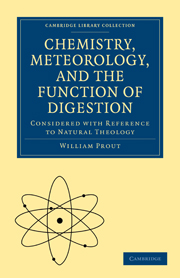Book contents
- Frontmatter
- TO THE READER [FIRST EDITION]
- TO THE READER [SECOND EDITION]
- Contents
- Dedication
- INTRODUCTION
- BOOK I OF CHEMISTRY
- BOOK II OF METEOROLOGY
- BOOK III OF THE CHEMISTRY OF ORGANIZATION
- CHAPTER I OF THE NATURE AND COMPOSITION OF ORGANIZED BODIES IN GENERAL, AS COMPARED WITH INORGANIC MATTER
- CHAPTER II OF THE MODES OF NUTRITION; COMPREHENDING A SKETCH OF THE ALIMENTARY APPARATUS; AND OF ALIMENTARY SUBSTANCES IN PLANTS AND IN ANIMALS
- CHAPTER III OF THE DIGESTIVE PROCESS; AND OF THE GENERAL ACTION OF THE STOMACH AND THE DUODENUM
- CHAPTER IV OF THE PROCESSES OF ASSIMILATION SUBSEQUENT TO THOSE IN THE STOMACH AND ALIMENTARY CANAL; PARTICULARLY OF THE CONVERSION OF THE CHYLE INTO BLOOD. OF RESPIRATION AND ITS USES. OF SECRETION. OF THE FINAL DECOMPOSITION OF ORGANIZED BODIES. GENERAL REFLECTIONS AND CONCLUSION
- APPENDIX
CHAPTER III - OF THE DIGESTIVE PROCESS; AND OF THE GENERAL ACTION OF THE STOMACH AND THE DUODENUM
Published online by Cambridge University Press: 29 August 2010
- Frontmatter
- TO THE READER [FIRST EDITION]
- TO THE READER [SECOND EDITION]
- Contents
- Dedication
- INTRODUCTION
- BOOK I OF CHEMISTRY
- BOOK II OF METEOROLOGY
- BOOK III OF THE CHEMISTRY OF ORGANIZATION
- CHAPTER I OF THE NATURE AND COMPOSITION OF ORGANIZED BODIES IN GENERAL, AS COMPARED WITH INORGANIC MATTER
- CHAPTER II OF THE MODES OF NUTRITION; COMPREHENDING A SKETCH OF THE ALIMENTARY APPARATUS; AND OF ALIMENTARY SUBSTANCES IN PLANTS AND IN ANIMALS
- CHAPTER III OF THE DIGESTIVE PROCESS; AND OF THE GENERAL ACTION OF THE STOMACH AND THE DUODENUM
- CHAPTER IV OF THE PROCESSES OF ASSIMILATION SUBSEQUENT TO THOSE IN THE STOMACH AND ALIMENTARY CANAL; PARTICULARLY OF THE CONVERSION OF THE CHYLE INTO BLOOD. OF RESPIRATION AND ITS USES. OF SECRETION. OF THE FINAL DECOMPOSITION OF ORGANIZED BODIES. GENERAL REFLECTIONS AND CONCLUSION
- APPENDIX
Summary
We proceed now to consider the most important function of the stomach, by which the assimilation of the food is begun. But before that function can be well understood, it is necessary to make a few remarks on the influence of water, in modifying the intimate constitution and the peculiar properties of alimentary substances. We have intentionally delayed these remarks, in order that in this place the chemical influence of water might be more strikingly exemplified.
Water enters into the composition of most organized bodies in two separate forms; which must be clearly distinguished, and which it is requisite that the reader should always bear in mind. Water may constitute an essential element of a substance, as of sugar or of starch in their dryest states; in which case, the water cannot be disunited without destroying the compound: or water may constitute an accidental ingredient of a substance, as of sugar or of starch in their moist states; in which case more or less of the water may frequently be removed, without destroying the essential properties of the compound. Now, a very large number of organized bodies, (perhaps all those to which our present enquiry relates) contain water in both these forms; both as an essential element, and as an accidental ingredient; and in most instances, it is impossible to discriminate between the water which is essential, and that which is accidental.
- Type
- Chapter
- Information
- Chemistry, Meteorology and the Function of Digestion Considered with Reference to Natural Theology , pp. 484 - 518Publisher: Cambridge University PressPrint publication year: 2009First published in: 1834



